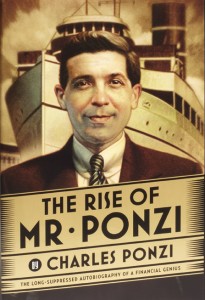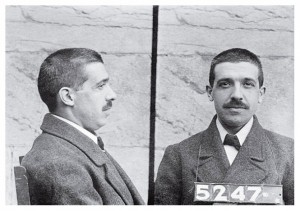Ponzi’s Plea
My house of cards had collapsed! The bubble had busted! I had lost! Lost everything! Millions of dollars. Credit. Happiness. And even my liberty! Everything, except my courage. I needed that to take my medicine like a man. To meet the future. Unquestionably, I was licked. For the time being. But no man is ever licked, unless he wants to be. And I didn’t intend to stay licked. Not so long as there was a flickering spark of life left in me. Like there was then. And there is now. Life, hope and courage are a combination which knows no defeat. Temporary setbacks, perhaps, but utter and permanent defeat, never! – Charles Ponzi, taken from his autobiography, The Rise of Mr. Ponzi: The Autobiography of a Financial Genius

The cover of Charles Ponzi’s autobiography – The Rise of Mr. Ponzi: Autobiography of a Financial Genius.
Nearly 90 years before the name Bernie Madoff was in the headlines, when the pyramid scheme was simply named the pyramid scheme, there was Charles Ponzi—the man whose legacy is a pillar in the Halls of Financial Fraud.
Charles Ponzi’s first trouble with the law happened in Canada in 1907, just four years after he had emigrated from Italy to the United States. After working odd jobs up and down the coast he eventually settled into a position working for a banker in Montreal. One day while out on business in the office of a business that patronized his bank, he found an unattended ledger book. Ponzi tore out a check and forged it to himself; this brilliant act earned him three years in Canadian prison. Upon his release he drifted back down to the United States, and within no time he was busted smuggling immigrants into the country, and that act got him two years in an Atlanta prison. After his release this time it appeared like he might have settled down. He moved back up to Boston, found a wife, and got gainful employment. Then one day he received an international letter from abroad with a postal reply coupon attached. Ponzi got another one of his brilliant ideas.
Ponzi realized that he could buy these coupons very cheaply abroad via foreign agents and take advantage of the currency exchange rate by turning them into U.S. dollars; this was all completely legal. Promising investors large returns of as much as 50 cents on the dollar he could make a killing. Eager participants were easy to find. So much so, in fact, that it was quickly apparent that the number of investors exceeded the volume of postal reply coupons he could purchase. He had a very simple solution—he would simply start paying investors with the money of other investors.
This strategy works very well as long as the amount of investors keeps growing…and for a while it did; $120,000 dollars taken-in during the month of April swelled to 6 million dollars in July. Though he must have seen the writing on the wall, Ponzi wouldn’t allow his game to come to an end. Rather than put his hands up in the air or flee, he took things to the next level. He expanded his business and diversified his investments nationally in steamship lines, movie theatres, and commercial real estate. Ponzi even played the role of philanthropist and donated $100,000 to an orphanage.
Eventually some reporters for the Boston Globe caught on to Ponzi’s game when they asked the post office how it was handling the influx of business it was doing in postal reply coupons (the investigative series they published in the Globe would earn them a Pulitzer Prize for public service). The shoe dropped pretty hard on Charles Ponzi. By the time the scheme crashed he owed more than 20 million dollars to his investors.(1) It was also discovered that throughout the whole scheme Ponzi had only spent $61 on postal reply coupons. The foreign agents abroad never existed.
After serving over three years in jail Ponzi absconded to Florida while he was awaiting further charges in Massachusetts. Amazingly, his scheming was not over. He would take advantage of the real estate boom in the sunshine state and start the Charpon ( Charles Ponzi) Land Syndicate. Charpon’s tactic was to sell swampland and underwater property to unwitting investors. Unfortunately for Ponzi, this earned him another trip to the can. When released upon payment of his bond, Ponzi finally began to panic. He shaved his head, grew a stache, and tried to sneak out of the country on an Italian steamship leaving Texas. Ponzi was apprehended while at port in New Orleans, and in 1927 found himself at the state prison in Charlestown, Massachusetts, awaiting his trial and deportation.
The Maryland connection to this story begins with a letter found while processing the Morris Soper Papers, and provides yet another example of the staggering scope of this collection here at the Maryland Historical Society. In 1934 Charles Ponzi (signing his name Charles Ponzi, esquire) writes to Soper from the state prison requesting information on a Court of Appeals opinion he had written during his first year on the bench of the 4th Circuit.

A letter from Charles Ponzi to Judge Morris Soper requesting a copy of a deportation opinion he had written. Morris Soper Papers, MS 3121, Box 73E, 1934, MdHS
Soper does not hesitate to reply to Mr. Ponzi, and evidently enclosed a copy of the opinion to him in response to the request. Based on anecdotal evidence of Soper’s character this most likely can be attributed to his desire for Ponzi to have access to information so that his trial could be as fair as possible. As I continue to uncover opinions in the collection I will be curious to find out if Soper reversed the opinion of Chesnut, and if so, is there explanatory correspondence between the two men about this particular case. It would seem that if Ponzi was interested in the case the opinion would have been written in his favor, but that is conjecture at this point(2).
Even though Judge Soper obliged Charles Ponzi’s request, it was to no avail. Having lost much of his former charisma, Ponzi was eventually released and deported back to Italy later in 1934. Though there are some contradictions in stories about his later life, it appears that his cousin, a friend of Italian Prime Minister Benito Mussolini, got him a job working for an airline that traveled back and forth between Brazil and Italy. The airline was shut down by the Brazilian government during World War II shortly after it was determined that it had been ferrying strategic supplies back to Italy with its passengers. Charles Ponzi died in the charity wing of a hospital in Rio de Janeiro in 1949 and was buried in a pauper’s grave. (Eben Dennis)

Charles Ponzi awaiting his trial for forgery at the state prison in Massachusetts. This public domain image was found on Smithsonian.com .
Footnotes:
(1) More than 220 million in 2014
(2) It may be more likely that the opinion does not involve the definition of “moral turpitude” but whether or not Ponzi’s crime was two separate actions. As Ponzi says, “..punishment by two separate jurisdictions for one and the same transaction, prosecuted under different aspects.”
Sources:
Bryson, Bill. One Summer: America 1927
Ponzi, Charles. The Rise of Mr. Ponzi: the autobiography of a financial genius.Digital Mammoth editions. http://pnzi.com/
In Ponzi We Trust. By: Darby, Mary, Smithsonian, 00377333, Dec98, Vol. 29, Issue 9
Immigration Act of 1917, Section 19 accessed here http://library.uwb.edu/guides/usimmigration/39%20stat%20874.pdf
Case No. 3218, Tassari v Schmucker, 1931. Accessed here http://wv.findacase.com/research/wfrmDocViewer.aspx/xq/fac.19311107_0040001.C04.htm/qx
Morris A. Soper Papers, 1900-1962, MS 3121, Maryland Historical Society
Darby, Mary. “In Ponzi We Trust.” Smithsonian Magazine. December 1998. accessed at http://www.smithsonianmag.com/people-places/in-ponzi-we-trust-64016168/?page=2


![[page 2] Morris Soper Papers, MS 3121, Box 73#, 1934, MdHS](https://www.mdhistory.org/wp-content/uploads/2014/04/MS3121_ponzi_letter_2.jpg)